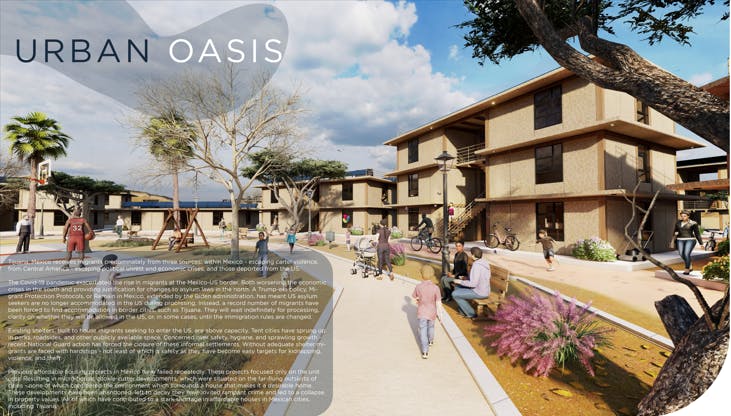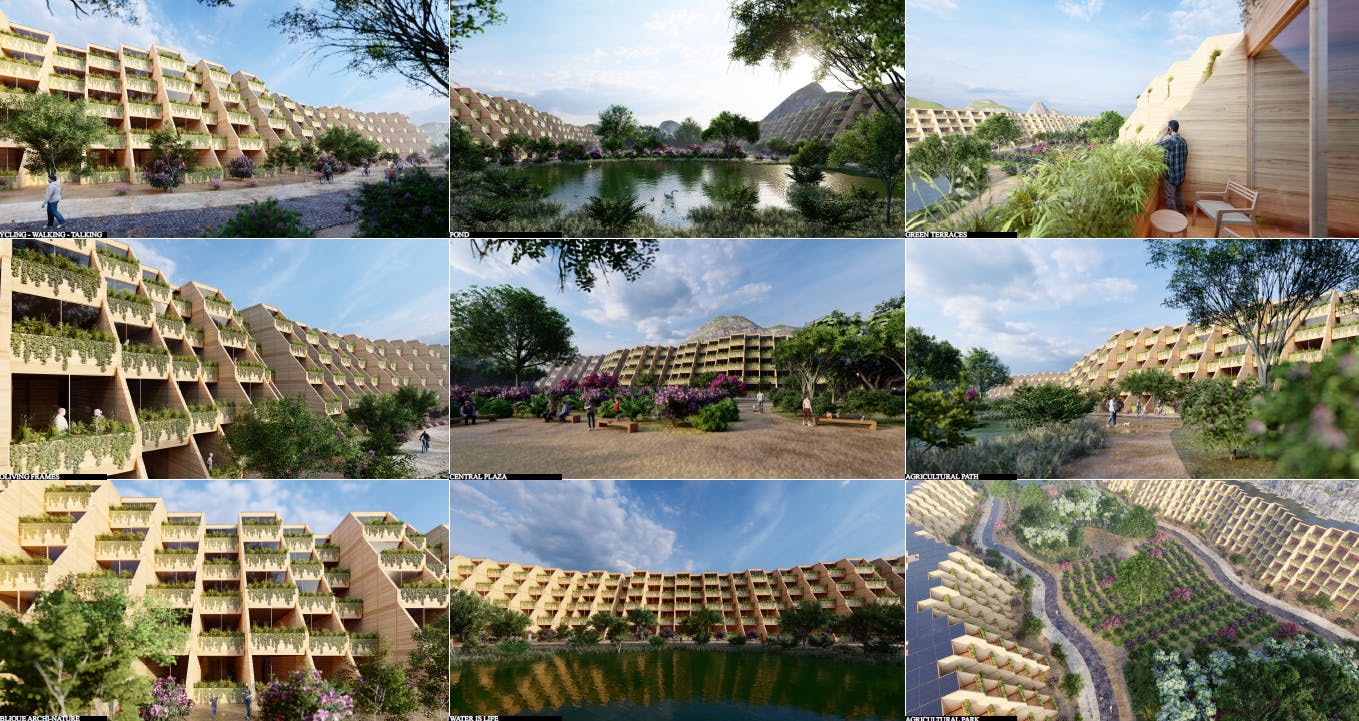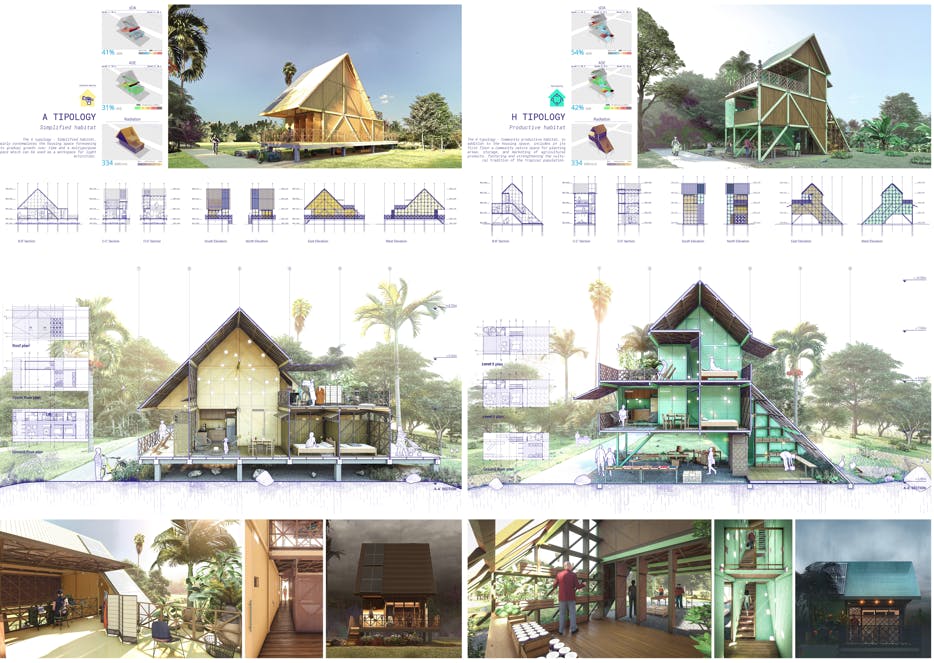Table Of Contents
Table Of Contents
About the Competition
As climate change intensifies, housing stability will be increasingly under threat. The total cost of natural disaster damages neared $50 billion in September 2020 in the United States alone, already surpassing the total cost for all of 2019 – and this trend is only accelerating over time. The landmark IPCC 2021 report warns of increased extreme heatwaves, droughts, and flooding, as well as a key temperature limit on track to be broken in just over a decade. The report “is a code red for humanity” according to the UN chief, but scientists say a catastrophe can be avoided if the world acts fast. In order to combat the climate and housing crisis, the building sector must act by integrating sustainable strategies into the design process. To shed light onto this issue, cove.tool hosted its inaugural International Architecture Design Competition. The intent was to solicit design ideas for affordable, carbon positive housing that can be replicated in multiple neighborhoods, cities and countries. Entrants were challenged to design carbon-positive affordable housing using cove.tool’s drawing.tool software, with a chance to win a $50,000 cash prize. They rose to the challenge and exceeded expectations.

Participation
With over 1100 registrants from 100+ countries, the competition was a huge success. cove.tool received an abundance of high-quality entries and was pleased with how many architects, students, and enthusiasts displayed an earnest interest in sustainable building design and affordable housing. Projects ranged from micro-homes to tall buildings depending on the selected context.
The Winners
The $50K Grand Prize winner is Mr. Saumya Ganguli, founder of Somnium London Limited, with his project, Innovative, Ultra-Low-Cost, Carbon-Positive, Prototype Housing Design, Sunderbans, India! Honorable mentions include Samuel Barcenas Suarez, Francisco Javier Angulo Grijalva, Ricardo de Matos Camarinha, and Stuart James Murray with their project, Urban Oasis, Fernando Donis, Abraham Mena, Daniel Gaytán, and Alfredo Hernández of DONIS Studio with their project, COLIVING FRAMES, and Alejandro Vargas M, David Mesa A, Nicolás Jaramillo U, and Juliana Osorio of Entropía Arquitectura Adaptiva with their project, Adaptive System for Tropical Habitat!
The winning project, Innovative, Ultra-Low-Cost, Carbon-Positive, Prototype Housing Design, has a design philosophy geared towards achieving an innovative, sustainable, cultural and site-responsive, research-based system-oriented, ultra-low-cost-housing prototype, using waste-recycled and locally available materials to achieve Carbon Positive Affordable Housing for a typical site-context in a low income, natural disaster-prone estuary belt of the Sundarbans in India. It is meant to serve as an example which can be applied to other similar climatic and site contexts, allowing for much wider application. It provides replicable, self-build capable, low-cost schematics that focus on making use of the surrounding environment to decrease energy use and carbon output.

The first runner up, Urban Oasis, is a community-level approach to sustainable and affordable housing for migrants within the chosen location of Tijuana, Mexico. This approach benefits from economies of scale, reduced transport costs, community safety, service delivery, and opportunity generation, each of which contribute to affordability and sustainability as well as quality-of-life improvements – a metric previously ignored in several now-abandoned, Mexican affordable housing projects. The project considers sustainability holistically across economic, environmental, and social dimensions and provides innovative solutions, such as inclusion of a commercial space within each unit, which creates an opportunity for each house to be a revenue generating asset, and tiered construction, which allows each household to grow in a unique way according to individual needs through provision of a framework for further growth and expansion with lower upfront cost.

The second runner up, Coliving Frames, champions outlining a bottom-up framework of multiple typologies, specific to the needs of the manifold populations and climates, rather than master planning urban areas of exacerbated difference. It replaces urbanism with critical regionalism that considers the resources and environment of the diverse regions of the Earth, all of which take carbon positive outcomes and affordability into consideration. Depending on the region, different building materials are selected based on which is best suited to each territory. Instead of creating disjointed urbanized regions, the project asserts the need for sustainable framed cities that integrate the countryside (agriculture) and the city – not only to protect nature, but also to interact with each other.

The third runner up, Adaptive System for Tropical Habitat, focuses on developing countries, mainly located in the world’s tropical zone, where 45% of the world’s population is concentrated, as these areas are the most vulnerable to the effects of climate change. The project combines multiple typologies to fit the respective needs of each potential tropical habitat type. Instead of simply creating a specific design, this proposal seeks to generate a replicable, scalable, and sustainable system, combining traditional tropical construction techniques with contemporary tools and methods to improve the future quality of life of its inhabitants.

The Jury
The esteemed panel of jurors included M. Casey Rehm, Coordinator of the Masters of Science in Architectural Technology post-graduate program and Director of the Platforms and Automation Laboratory at The Southern California Institute of Architecture, Dora Epstein Jones, PH.D., Architectural Theorist, Historian & Instigator and Chair of Architecture at Texas Tech University, Graham Hill, Founder and CEO at The Carbonauts, as well as ExceptionLab Inc and LifeEdited, Ralph Raymond, NOMAtl Past-President, AIA GA President-Elect, and Project Architect at HOK, Randall Deutsch FAIA, LEED AP, Clinical Associate Professor at University of Illinois Urbana-Champaign, author, international keynote speaker, AI researcher and licensed architect, and Sanford Kwinter, writer and architectural theorist, Co-Founder of Zone Books Publishers, and Professor of Theory and Criticism at the Pratt Institute. cove.tool was honored to host such a distinguished group of judges!